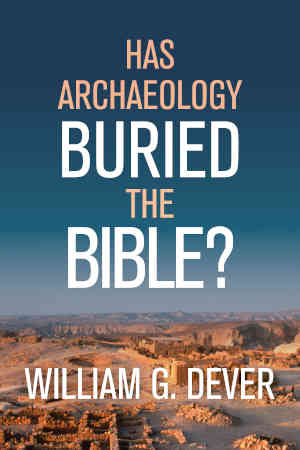
Has Archaeology Buried the Bible? William Dever
William Dever spent thirty years conducting archaeological excavations in Israel and nearby. Now in his eighties, he continues to write and lecture.
This book is his latest. It covers the Old Testament in the period up until the capture of Jerusalem in the early 6th century. In it he outlines how archaeology confirms or questions the Biblical accounts.
He writes as a non-believer, but isn’t antagonistic to Christian and Jewish belief.
My interest in this book
I reviewed a previous book of Dever’s, Beyond the texts, in 2018. It was a detailed account of the archaeology of Israel covering the period of about 1300 BCE to 600 BCE, the period when Israel was forming as a nation and the period of the monarchy.
I found that book fascinating, in both the archaeological detail and in the picture he painted of Israel at that time. So when I saw this new book, I was immediately interested. It was effectively a follow-up, his broad conclusions from the archeology on the question of what in the Old Testament is historical and of cultural value.
There are many conclusions and opinions in Old Testament archaeology, from the minimalists who tend to think the Old Testament contains very little that is historical to the maximalists who think it is mostly historical.
A layperson like me has to find some middle ground. I would judge Dever to be slightly on the minimal side of centre, with no belief in the supernatural. So as a christian, I will likely accept a little more than he does. But he provides a solid basis for me to start from.
What does archaeology tell us?
The book follows a pattern where he addresses each period by telling the Bible’s story and outlining what archaeology can tell us. Then he puts the two together by saying what he thinks we can conclude about the history and what we can learn from it all.
Many of this book’s conclusions can be found in the earlier book, but this book’s scope is broader and it contains little of the archaeological detail of Beyond the texts. So it is easier and shorter reading.
His broad conclusions?
The patriarchs (Abraham, Isaac, Jacob, etc)
These stories were told to explain origins and teach about life. The historical and cultural settings are generally correct and the authors probably used early sources that had been told and re-told for centuries. Archaeology cannot verify the stories themselves, which appear to have been “fictionalised” though probably not totally invented. Some elements appear quite fantastic.
Moses and the Exodus
There is evidence of Hebrew (or other Asiatic) slaves in Egypt, used for building works. And there may be evidence that some slaves escaped to Canaan, but he thinks the numbers were more likely in the hundreds than millions. Beyond this, he believes there is no evidence for the Exodus and little evidence against it (apart from the numbers).
Joshua and the conquest of the Promised Land
Here there is plenty of archeological evidence and most of it is against the conquest account in the first half of Joshua. The archaeology shows there were never 2-3 million people in Canaan at that time, though there WAS an identifiable nation of Israel. Most of the cities said to be taken by Joshua were not destroyed at all, or not at that time. Nevertheless there is evidence of much warfare, and the destruction of the cities of Hazor and Bethel do more or less match the Joshua account.
The accounts in the second half of Joshua, and the book of Judges, appear much closer to the archaeology and the historical evidence. In these sections there was no large scale and total invasion, but a slow process of cultural change.
Living in the land
Here, the Biblical accounts (in Judges and Samuel) ring true to the archaeology, although the individual stories cannot be verified. People of disparate cultures and religions lived side by side, sometimes peacefully, sometimes not. Gradually the nation of Israel formed and its culture and religion became more dominant.
This is perhaps my favourite chapter as it gives interesting insights into the geography, culture and living conditions of the time.
The monarchy and the end
There were kings over the nations of Israel and Judah, from about 1000 BCE to 586 BCE when the Babylonians conquered Jerusalem and took the leading citizens into captivity. While archaeology cannot confirm the individual stories, Dever says the Biblical accounts ring true to what we know. Many aspects of the history of these times are confirmed in the histories of surrounding nations.
The evidence suggests to him that the religious beliefs and reforms of the priests and some of the kings in Jerusalem had less effect than we might think on the common people in the countryside. From figurines, household altars and occasional inscriptions, it seems that Yahweh was often worshiped as a tribal god with his consort Asherah. It probably wasn’t until the destruction of the kingdom of Israel and the captivity of the people of Judah that most of the Jews followed a truly monotheistic religion.
Has archaeology buried the Bible?
Dever’s general conclusion is that the “historical” sections of the Old Testament are a mixture of fact and legend (in various proportions), told for moral and national identify purposes.
As an unbeliever, he can take an objective view, but he is also sympathetic to the cultural relevance of the Bible to western Christians and Jews. So he draws some moral or life take home messages from the text. I found these the least convincing part of the book.
Reflections
I am comfortable with the general thrust of his conclusions. They agree in principle with how CS Lewis viewed the Old Testament, although he takes a more sceptical view than CS Lewis did.
The Exodus story is of particular importance for both Christians and Jews. Dever is sceptical about most aspects of the story, though some other scholars see a little more history there.
As a christian, I feel free to believe God was at work through this whole process. I feel we cannot in truth hold to the Bible’s history being accurate, but we should rather be somewhat agnostic about the events before the monarchy. I think we can hold this view without it harming the integrity of our belief in Jesus.
Dever’s conclusions and my slightly more positive assessment may be a little scary for some christians, but I believe there is nothing to fear and much to be gained.
For a more detailed view of my own conclusions, see Understand the Bible, save your faith.



